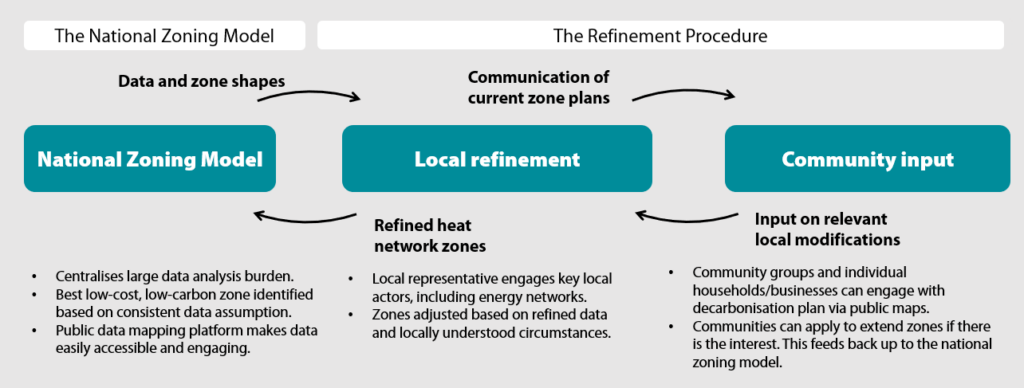Regen has responded to the latest round of the UK government’s consultation on heat network zoning, highlighting two key improvements to focus on.

Context
It’s widely accepted that heat networks will play a vital role in reaching net zero. The Climate Change Committee sees as much as 20% of the UK’s total building heating demand being met by heat networks by 2050, yet currently this figure sits at just 3%. Heat networks should be at the core of plans for decarbonised urban areas and areas beyond, as they do successfully in countries such as Denmark.
Heat network zoning, and this consultation in particular, looks to accelerate the rate of heat network deployment by identifying zones where they are expected to offer the lowest-cost, lowest-carbon option for decarbonising heat. Within these zones, a special policy framework will be established, requiring certain specified building types to connect, including:
- New buildings
- Existing communally heated buildings
- Some existing, non-domestic, non-communally heated buildings.
The heat network zoning process has already been through a round of consultation to establish views on the broad principles of the policy as a whole; this consultation zooms in on the role of central and local government, zone identification, requirements in zones, and zone delivery. In particular, the consultation looks at two key roles that will be established to govern the zoning process:
- Central authority: A new central body established to oversee all zones and zone coordinators and carry out national-level tasks. It will be responsible for creating the ‘National Zoning Model’, which will map indicative zones across England where heat networks are expected to be the lowest-cost technology to decarbonise heat.
- Zone coordinator: A new local role that will oversee and lead on local implementation on heat networks, helping refine zones, collect data and engage with local stakeholders.
Our response focuses on the implementation and responsibilities of these roles, as well as more generally the requirements of the methodology proposed for zoning.
Regen’s view
The approach to heat network zoning laid out in this consultation is a positive step forwards for the local decarbonisation of heat and could open up a host of new heat network opportunities for local authorities and local actors. There is inherent value in a local zoning approach to heat decarbonisation, particularly in terms of promoting economies of scale and supporting individual decision making; our Local Delivery of Clean Heat paper delves further into the detail of these benefits.
The zoning methodology laid out can also work to align key actors, including networks, local authorities and community organisations, on defined decarbonisation pathways and reduce the burden on overstretched local authorities. However, two areas that we raised in our response were:
1. Stronger community engagement
We are keen to see a clearer role for community engagement and a greater emphasis on ‘bottom-up’ input in zone creation. Stronger engagement could play two important roles:
- Creating more trust and awareness around the zoning process. Without proper care, there’s a risk that fewer building owners will be prepared to connect and communities might respond negatively to changes in their heating system or to the disruption caused by network construction.
- Allowing for applications from enthusiastic communities on the periphery of the zone who would like to make a case to connect to the heat network, extend the zone or define their own smaller zones.
Figure 1: High-level zoning process in which communities have the opportunity to be included (more detail provided in Regen’s response to Question 1)
2. Integration with wider decarbonisation plans
There is currently no consistent framework under which decarbonisation goals are translated into local action. It’s important to coordinate this zoning approach with these other major changes in order to avoid replication of data collection or the overlapping of policy.
The methodologies and processes established from this consultation should intersect and complement other local area plans and frameworks that already exist or are in development, such as Local Plans, Local Area Energy Plans, the establishment of the Regional Energy Strategic Planners and other changes such as those to building regulations or the Energy Company Obligation scheme.
To support this consultation response, we sought views from Bristol City Council, Plymouth City Council and Bournemouth, Christchurch and Poole Council, as well as Bristol Energy Network. All groups, including ourselves, were supportive of the zoning approach, and there was agreement that it will be a crucial framework to enable the economies of scale required to meet government’s ambitious heat network deployment targets. Our full response to 18 of the consultation questions can be seen here.

